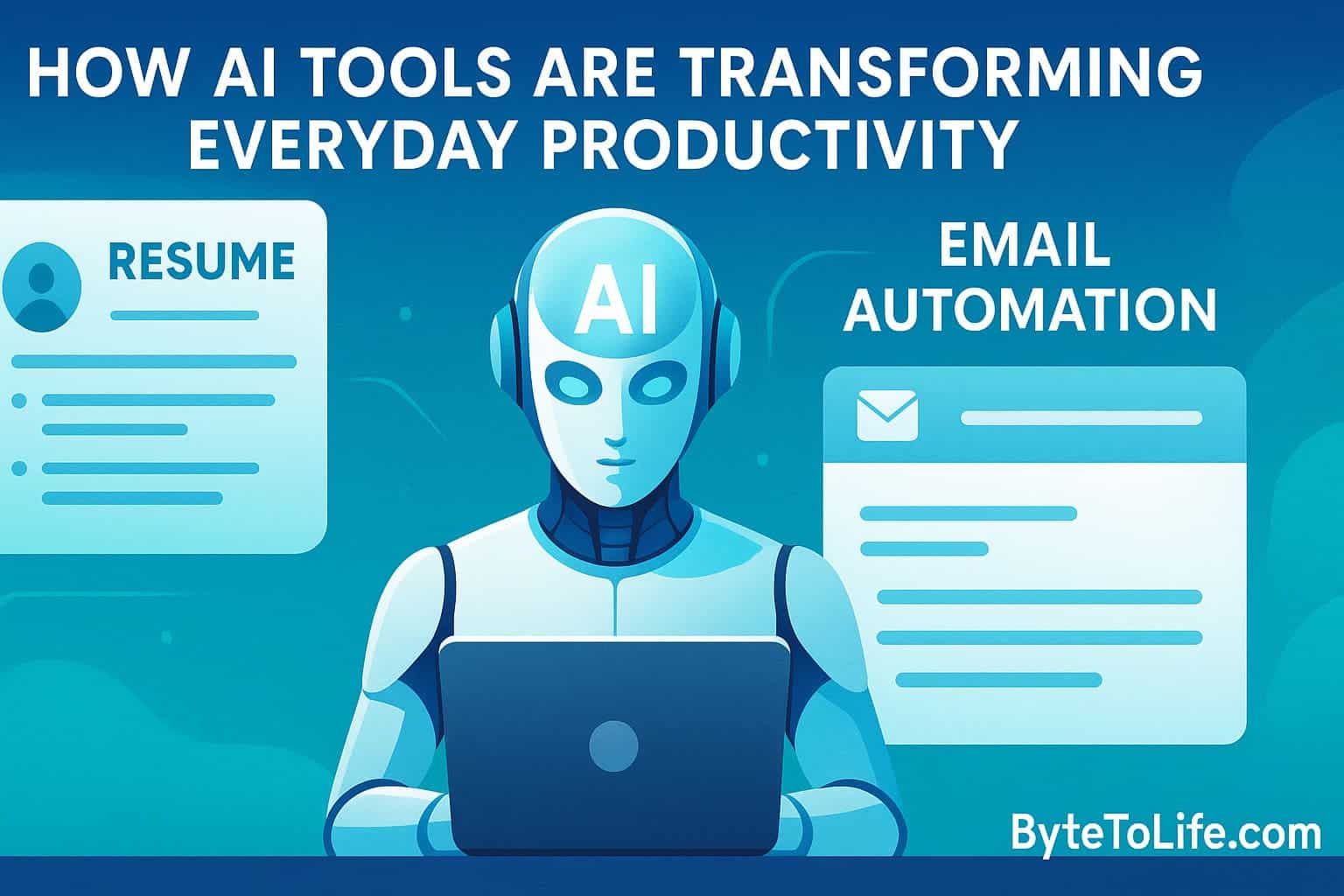Welcome to the age of intelligent productivity. As artificial intelligence continues to evolve, it’s transforming the way we work, write, and communicate. From crafting professional resumes to drafting polished emails, AI tools are becoming essential allies in our daily digital routines. In this article, we explore how AI is reshaping productivity for individuals and businesses alike—and how you can ride this wave to get more done in less time.
The Rise of AI in Everyday Tasks
Thirty days ago, if you searched “AI resume writer” or “AI email assistant,” you were far from alone. Google Trends data in the United States shows a surge in interest around tools that promise to automate or enhance everyday professional tasks. As remote work becomes more prevalent and efficiency more critical, AI-powered apps are stepping up in a big way.
Why AI Productivity Tools Are Gaining Popularity
- Time-saving automation – AI reduces the time spent on repetitive tasks like writing follow-up emails or formatting resumes.
- Cost-effective assistance – You don’t need to hire a writing coach or assistant when AI can help for free or at a low cost.
- Instant feedback – Get grammar corrections, tone adjustments, and structure suggestions in real time.
Popular AI Tools Powering Productivity
Let’s look at some of the most widely used AI productivity tools that are changing the game today:
1. ChatGPT
OpenAI’s ChatGPT is one of the most versatile tools on the market. It can write entire blog posts, summarize reports, generate email templates, and even simulate interview answers for job seekers. Many professionals are using it to brainstorm ideas or refine their resumes with tailored bullet points.
2. Grammarly
Grammarly’s AI not only checks grammar and spelling but also suggests clarity improvements and tone adjustments. Its premium version goes further, offering rewrites and content suggestions that rival human editors.
3. Copy.ai & Jasper
These platforms are favorites among marketers and copywriters. They generate engaging content quickly—product descriptions, ad copy, emails, you name it. They’re ideal for those who need high-quality writing at scale.
4. Notion AI
Integrated into the popular note-taking app, Notion AI helps generate to-do lists, meeting summaries, and blog outlines. It fits seamlessly into workflows for project managers and digital creators.
Boosting Resume Writing with AI
Creating the perfect resume can be daunting, but AI makes it easier and more personalized. Tools like Resume Worded and Zety analyze job descriptions and help you tailor your resume accordingly.
Key Features of AI Resume Builders:
- Keyword optimization based on job postings
- Real-time formatting and structure suggestions
- Grammar, clarity, and tone enhancements
- Templates that are ATS-friendly
Whether you’re a recent graduate or switching careers, AI tools can give your resume the polish it needs to stand out.
Streamlining Email Communication with AI

Writing professional emails takes time and often involves second-guessing tone and phrasing. AI tools now help automate this process while keeping your messages human-like and engaging.
How AI Helps with Emails:
- Auto-generating subject lines that boost open rates
- Drafting cold emails, follow-ups, and responses
- Improving grammar and structure
- Personalizing outreach at scale
For example, tools like Flowrite and Superhuman leverage AI to suggest better ways to phrase emails and speed up your writing process.
The Benefits: Why It’s a Game-Changer
Adopting AI tools for productivity doesn’t just help you work faster—it helps you work smarter.
Major Benefits Include:
- Improved efficiency: Automate routine tasks to focus on what matters.
- Consistency and quality: Maintain a high standard across all communications.
- Confidence: Write with clarity and professionalism, even under pressure.
Challenges and Ethical Concerns
Despite their benefits, AI tools raise some concerns:
- Over-reliance: Relying too much on AI can hinder skill development.
- Data privacy: Some tools may store your content. Always check privacy policies.
- Bias in output: AI-generated content may reflect biases present in training data.
Use AI responsibly. It should augment your productivity, not replace your judgment or creativity.
Case Study: AI in Corporate Environments
Several companies now integrate AI into daily operations. For example, Deloitte uses AI-driven tools to automate internal emails and draft client proposals. At Salesforce, AI helps generate sales pitches tailored to individual clients. These tools not only improve speed but also free up time for employees to focus on strategy and innovation.
Best Practices for Using AI Tools Effectively
To get the most out of AI productivity tools, follow these tips:
- Customize AI output before publishing or sending.
- Stay informed about updates and new features.
- Combine AI with human creativity for the best results.
- Train your team on responsible AI usage.
If you’re a content creator, check out our guide on Digital Productivity for more tips and tool comparisons.
Looking Ahead: The Future of Productivity Is AI-Powered
The integration of AI into daily productivity tasks is only just beginning. As natural language processing and machine learning improve, expect even smarter assistance tools—ones that understand context better, handle more complex tasks, and integrate seamlessly into all your apps.
What to Expect in the Next Few Years:
- Real-time collaboration with AI co-authors
- More voice-activated AI productivity assistants
- Deeper integration with platforms like Slack, Google Docs, and Zoom
Conclusion
AI tools have quietly but significantly changed the productivity game. Whether you’re fine-tuning your resume, drafting better emails, or organizing your workday, there’s likely an AI tool to make the process faster, easier, and better. The key is to use these tools wisely—augmenting your abilities while keeping your unique creativity and voice intact.
Ready to embrace the future of work? Start exploring AI tools today and unlock your full productivity potential.
For more on AI, cybersecurity, and smart digital strategies, don’t forget to bookmark ByteToLife.com.



